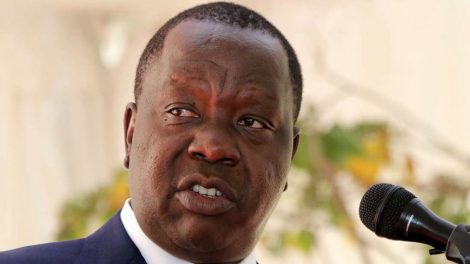Matiang’i reveals Al Shabaab recruitment centres
By People Team, January 7, 2020By Emeka-Mayaka Gekara and Zadock Angira
Kenyan universities have become major recruitment centres for the al Shabaab terror group whose members attacked a military base in Lamu on Sunday morning, killing three Americans, the government has warned.
The warning came as the US yesterday confirmed one service member and two Department of Defence (DoD) contractors were killed during the Manda Bay attack in Lamu. Two other DoD members are nursing injuries.
“There is evidence of recruitment at our universities. Universities have been turned into hubs for money laundering by terror organisations,” said Matiang’i at a meeting with editors in Nairobi yesterday.
Engineering, law students
The CS pointed out that some of the terrorists involved in past attacks were studying law and engineering in local universities, and some came from wealthy families. He said the students were motivated to join terror groups because of financial incentives.
Matiang’i, who was accompanied by his Information, Technology and Communication counterpart Joe Mucheru, Inspector General of Police Hillary Mutyambai, Directorate of Criminal Investigations chief George Kinoti and Interior PS Karanja Kibicho, accused some universities of employing former police officers with criminal records to head their security departments.
“There is a nexus between money laundering, drug trafficking and terrorism,” said the minister, indicating that the government had resolved to ensure “no attacker is left to escape”.
Mutyambai maintained that no Kenyan was killed during the Manda raid, which saw four militants killed by Kenyan soldiers.
He said the speed of response to terror attacks had improved as well as capabilities, adding: “We have specialised units, better equipment and increased our effectiveness in response to threats as well as border patrols.”
Matiang’i challenged the US to support Kenya’s efforts to have al Shabaab enlisted among the global terrorist organisations under the UN Security Council resolution 1267 of 1999.
“We are in the neighbourhood of hell. Terror is brewed next door,” said Matiang’i in reference to Somalia, the home to the terror group.
Raise income
“We are asking the US to support our campaign for al Shabaab to be listed as a global terrorist organisation. Al Shabaab is not a missionary organisation. If listed we will decimate this group that uses blackmail and other criminal means to raise income for its activities.”
According to the CS, the move would provide the security agencies with a multifaceted arsenal of administrative, legal, and political means to fight the militants.
According to the UN, the main aim of delisting such groups is to delegitimise them and cut off external support. They are also effective in constraining the operations of non-governmental organisations and other peace practitioners since any form of interaction with such groups is criminalised.
Those who oppose the sanctions say they can severely impede peaceful dialogue and consequently negatively affect the resolution of conflicts.
Kenya stands to benefit should the group be listed because it would substantially weaken it financially and curtail the flow of arms and other aid, including food, to their region of operation. Kenya has, on several occasions, tried to have al Shabaab designated as a terror group alongside others like Alqaeda, the Taliban and ISIL.
The latest effort was on August 28 last year when the UN Council rejected Kenya’s request, which is being spearheaded by the Foreign Affairs CS Monica Juma.
Last July, following the attack on Medina Hotel in Somalia that left at least 26 people dead, Juma again urged the international community to hasten the listing of the militants. She had earlier on May 21 last year made similar calls when she held talks with European Union High Representative for Foreign Affairs and Security Policy, Federica Mogherini.
The council can take several actions, which may not involve use of armed forces, including designating groups and individuals, in order to maintain or restore international peace and security.
The resolution 1267 was adopted unanimously on October 15, 1999 and has since then established 30 sanctions against three proscribed groups.
However, it has been opposed by the US humanitarian agencies and diplomats, who have insisted that the blacklisting could cause suffering to innocent civilians.
